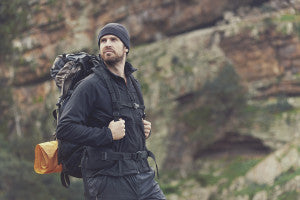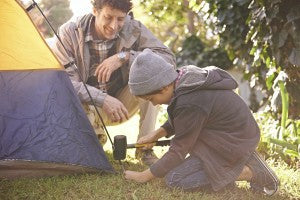This is a guest post by J.D. Phillips of SurvivalCrackas.com
I'll cut straight to the chase on this one, if you want to be a
successful prepper you need to not only
study it, but put it into action.
Develop these seven habits if you want your prepping to really pay off.
1) Action

Believe it or not, many people who like to call themselves "preppers" don't actually practice prepping. They simply binge watch
Bear Grylls or
Survivor man on TV. They read
articles about prepping on the internet, they talk about survival with their friend and watch hours of prepping videos on YouTube. These people aren't preppers – they're just fans of prepping shows and videos. If you've been thinking about prepping for a long time, but haven't really made any substantial progress maybe it's time to start practicing what you preach.
Remember; real preppers believe in action, not articulation. So instead of skipping to the next article after you have finished reading this one, try implementing some of the tips outlined below.
2) Effective Preppers are incredibly fit!
Believe it or not, f
itness is one of the most ignored aspects of survival. No matter how much expensive gear you have (cool scopes, and 5 AR-15s), you are definitely not
prepared for a disaster if you're not fit.
Your $1,000 mountaineering shoes are pretty much useless if you start seeing black after jogging for just a couple of minutes!
Imagine the kind of abuse your body will go through when things
do get crazy. Depending upon the situation, you might have to swim for hours and walk for days! You might have to battle through extreme weather and take down several bad guys (or girls). Now, this may be a
bit of an exaggeration - but you never know until it's time to jump into action!
Preparing for survival isn't any different than preparing for war. So to be a real prepper, you
have to have an exercise and diet plan.

Concentrate on cardio, strength training, and
self defense (karate, kickboxing, MMA etc.) Personally, I'm a huge fan of the workout program p90X3 - it allows you to get in a killer workout in just 30 minutes a day, 6 days a week. If you can complete that, you'll definitely have a leg up when it's time to put your survival skills into practice!
Apart from physical fitness, it's also important to be emotionally and spiritually fit. You have to be able to stay calm in a high pressure environment.
Meditate every day for at least five to ten minutes and keep your mind sharp by playing memory and logic based games. You want to survive right? So make sure you're able to keep up when things take a turn for the worse.
3) Keep improving and learning constantly
A good prepper always strives to acquire new knowledge and skills. For many people, prepping simply means going on a shopping spree: they buy extra food and water; they prepare a
bug out bag and get themselves a cool machete or combat axe and camo outfit, and do nothing other than that. They don't practice their skills, and after a while, the novelty wears off and they forget all about survival.
Understand that prepping is not something that can be accomplished in a weekend. You have to constantly observe, learn, and evolve as a prepper.
4) An intelligent prepper has more than one stash
You might think that your basement or the garage is the perfect place to store extra food, water, supplies etc.
However, what if there is a massive earthquake and you can't access that location?
What if your property burns down along with all the supplies?
Years of preparation can be destroyed within seconds. So it's a good idea to have more than one stash. And yes, you should have a
spare bug out bag too!
How about putting some stuff away in your office (or workplace)? It does not have to be anything conspicuous…Just a box of supplies under the desk will suffice. Your beach house or cabin in the mountains is also a great place for a backup stash.
5) A true prepper actively assesses risks and threats
 Always keep your head on a swivel. Situational awareness is key.
Always keep your head on a swivel. Situational awareness is key. Stay in touch with current events, news etc. Assessing risk does not mean being paranoid – it simply means being vigilant, like a soldier on guard.
We're not saying that you should live in constant fear of the future. However, you can't ignore reality. If you notice that the crime rate has gone up in your area, carry a pepper spray with you and improve the security of your home.
Carry a GPS if you're going out camping at a new location. Liquidate your investments if you foresee an economic crisis. Of course, you can't predict all types of catastrophes. However, you'll have a much better chance if you're constantly aware of what's going on around you. Simply recognizing a threat is not enough; you have to come up with a plan of action to avoid or neutralize it.
6) A prudent prepper knows how much to reveal
Do collaborate with other preppers by all means. In fact, you are even encouraged to educate others about the relevance and importance of prepping in this day and age. However, be a little bit careful to not reveal too much information about your stash and plans. For example - don't go on Reality TV and show the world everything you have. That's not wise (but a lot of people do it). You don't want the wrong people to Replace out what you have and where - so keep the bragging and showing off of your gear to a minimum, but by all means get out there and help out and learn from others!
7) Nothing beats practical experience!

A true prepper goes to great lengths to
gain practical experience. It's easy to say that if you get stranded in the woods, you'll simply build a fire to signal for rescue and catch some fish in the meantime. However - ask yourself these questions, and answer honestly:
- Have you ever caught fish with paracord or a makeshift spear?
- Do you know how difficult it is to start a fire without a lighter or matches?
- Have you ever encountered wild animals before?
- Can you shoot down a moving target?
- Do you know how to tie a proper knot?
If you want to be effective in a survival scenario, you have to gain hands on experience by simulating a hostile environment.
Also, make sure that all your family members know what to do in case of an emergency.
As you may have already realized, prepping requires a significant amount of time and money.
Don't try to accomplish everything at once. Treat this like eating an elephant - take one bite at a time. Set small, realistic goals and work your way up gradually.
Now, get out there and start doing!
____
About the Author: J.D. Phillips Runs
SurvivalCrackas.com and lives with his family in Southern California. You can follow him on
Facebook and download his Guide
How to Build the Ultimate Disaster Kit free of charge!

 Believe it or not, many people who like to call themselves "preppers" don't actually practice prepping. They simply binge watch Bear Grylls or Survivor man on TV. They read articles about prepping on the internet, they talk about survival with their friend and watch hours of prepping videos on YouTube. These people aren't preppers – they're just fans of prepping shows and videos. If you've been thinking about prepping for a long time, but haven't really made any substantial progress maybe it's time to start practicing what you preach.
Remember; real preppers believe in action, not articulation. So instead of skipping to the next article after you have finished reading this one, try implementing some of the tips outlined below.
Believe it or not, many people who like to call themselves "preppers" don't actually practice prepping. They simply binge watch Bear Grylls or Survivor man on TV. They read articles about prepping on the internet, they talk about survival with their friend and watch hours of prepping videos on YouTube. These people aren't preppers – they're just fans of prepping shows and videos. If you've been thinking about prepping for a long time, but haven't really made any substantial progress maybe it's time to start practicing what you preach.
Remember; real preppers believe in action, not articulation. So instead of skipping to the next article after you have finished reading this one, try implementing some of the tips outlined below.
 Concentrate on cardio, strength training, and self defense (karate, kickboxing, MMA etc.) Personally, I'm a huge fan of the workout program p90X3 - it allows you to get in a killer workout in just 30 minutes a day, 6 days a week. If you can complete that, you'll definitely have a leg up when it's time to put your survival skills into practice!
Apart from physical fitness, it's also important to be emotionally and spiritually fit. You have to be able to stay calm in a high pressure environment.
Meditate every day for at least five to ten minutes and keep your mind sharp by playing memory and logic based games. You want to survive right? So make sure you're able to keep up when things take a turn for the worse.
Concentrate on cardio, strength training, and self defense (karate, kickboxing, MMA etc.) Personally, I'm a huge fan of the workout program p90X3 - it allows you to get in a killer workout in just 30 minutes a day, 6 days a week. If you can complete that, you'll definitely have a leg up when it's time to put your survival skills into practice!
Apart from physical fitness, it's also important to be emotionally and spiritually fit. You have to be able to stay calm in a high pressure environment.
Meditate every day for at least five to ten minutes and keep your mind sharp by playing memory and logic based games. You want to survive right? So make sure you're able to keep up when things take a turn for the worse.
 Always keep your head on a swivel. Situational awareness is key. Stay in touch with current events, news etc. Assessing risk does not mean being paranoid – it simply means being vigilant, like a soldier on guard.
We're not saying that you should live in constant fear of the future. However, you can't ignore reality. If you notice that the crime rate has gone up in your area, carry a pepper spray with you and improve the security of your home.
Carry a GPS if you're going out camping at a new location. Liquidate your investments if you foresee an economic crisis. Of course, you can't predict all types of catastrophes. However, you'll have a much better chance if you're constantly aware of what's going on around you. Simply recognizing a threat is not enough; you have to come up with a plan of action to avoid or neutralize it.
Always keep your head on a swivel. Situational awareness is key. Stay in touch with current events, news etc. Assessing risk does not mean being paranoid – it simply means being vigilant, like a soldier on guard.
We're not saying that you should live in constant fear of the future. However, you can't ignore reality. If you notice that the crime rate has gone up in your area, carry a pepper spray with you and improve the security of your home.
Carry a GPS if you're going out camping at a new location. Liquidate your investments if you foresee an economic crisis. Of course, you can't predict all types of catastrophes. However, you'll have a much better chance if you're constantly aware of what's going on around you. Simply recognizing a threat is not enough; you have to come up with a plan of action to avoid or neutralize it.
 A true prepper goes to great lengths to gain practical experience. It's easy to say that if you get stranded in the woods, you'll simply build a fire to signal for rescue and catch some fish in the meantime. However - ask yourself these questions, and answer honestly:
A true prepper goes to great lengths to gain practical experience. It's easy to say that if you get stranded in the woods, you'll simply build a fire to signal for rescue and catch some fish in the meantime. However - ask yourself these questions, and answer honestly:



7 comments
G Hansen
Re: not keeping all your physical preps in one spot— I’m not so sure about keeping things at work because if SHtf most work places will be locked up or otherwise inaccessible (plus many work from home or in rotating locations) so better idea to keep things in trunk of car; and hardly anybody has a beach house or cabin in the woods, so maybe dig a Big hole in a national forest and bury waterproof bins of supplies (pretty sure that will get you arrested). Most people won’t be able to get out of their homes even if the local authorities command it. Most people will shelter in place, at home, even if noxious fumes are out there. Because they have absolutely no other place to go to.
Cory Thomas
Knowing how much to reveal is something many people have trouble with, especially here in the states! But this was a fantastic post J.D., and thank you beprepared.com for sharing.
I write for survivethewild.net, and would love to have the opportunity to contribute to a site like this. Please let me know if you’d like to hear/read my ideas.
Thanks again J.D.!
Cory
Patricia
I haven’t seen any prepper info for anyone over 65 yrs. We are a majority of humans in this country but seem to be over looked. I know we aren’t the ones who will be on the move at least not moving miles at a time or are the ones who will stay in place if possible but we do need help in preparing the same as young people. We, my husband and I, are about 50 miles from the coast. Has anyone come up with any info for our age group?
Roxanne
Patricia, my favorite site is: www.foodstoragemoms.com Linda Loosli provides practical, easy-to-follow prepping for everyone, even us grannies!
Ulik aka Henry Ford
Great suggestions and head’s-up. I’m already on it. Hands’ on experience is next: camping out, hunting, and other essential natural living activity. Learning how to swim, and getting back to running are on my list as well. To collaborate and share the importance of prepping is vital for the lives of our loved ones, so much. Thanks, Emergency Essentials, for your service. Thanks go also to J.D. Phillips, for posting this article.
Angela
Thanks for this suggestion. I appreciate the advise for elderly and the disabled.
Jack
Yes, I agree with you. I am same age group as you, and have been using information available and adapting to my abilities. Personally, I am finding fitness to be the key point in my life, particularly strength training and cardio. Trying to combat age is pretty much a full time job, LOL. It would be nice to get an educated opinion on the specific requirements of prepping for our age group.